If you loved *Shutter Island*, you’ll get hooked on these mind-bending mysteries. Try *Memento* for its reverse storytelling or *The Game* for chaotic psychological twists. *Inception* and *Mulholland Drive* blur dreams and reality, while *Black Swan* dives deep into obsession. Don’t miss *Gone Girl* for its chilling deception, *Triangle* for a gripping time loop, and *Identity* for shocking identity revelations. There’s a lot more to uncover, so keep exploring these captivating films!
Key Takeaways
- *Memento* employs a reverse storytelling technique, keeping viewers engaged as they piece together Leonard’s fragmented memories and quest for vengeance.
- *Mulholland Drive* blurs dreams and reality, using haunting symbols to create a complex narrative that challenges perception and understanding.
- *Inception* explores themes of guilt and redemption through stunning visuals and intricate dreamscapes, leaving viewers questioning what is real.
- *Triangle* presents a chilling time loop, immersing audiences in psychological horror and uncertainty as characters face an unseen assailant.
- *Gone Girl* unveils shocking twists regarding identity and manipulation, critiquing relationship facades and media influence on public perception.
Memento
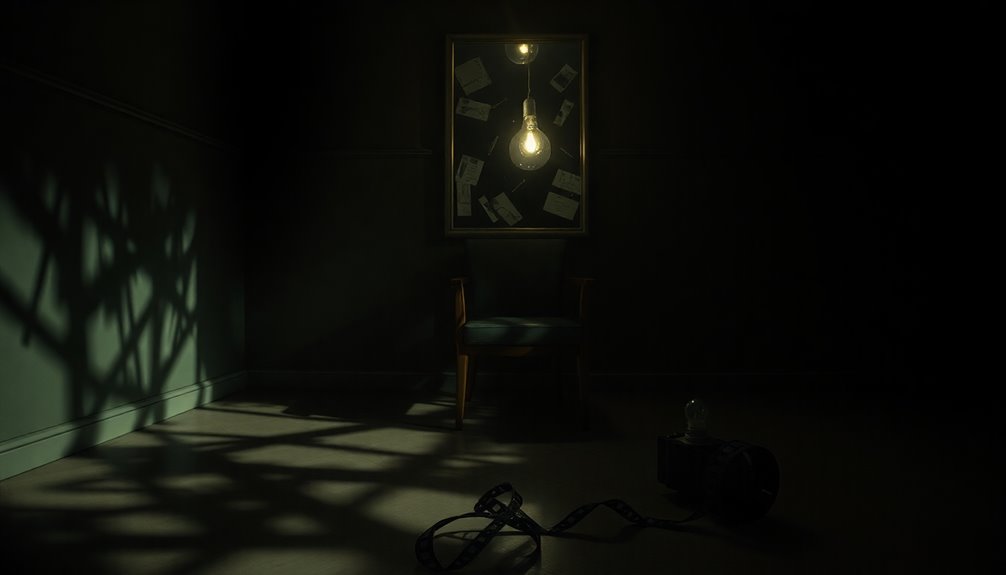
When you dive into *Memento*, you’ll quickly realize that its non-linear narrative sets it apart from traditional thrillers. The story unfolds in reverse order, keeping you on your toes as you piece together the mystery surrounding Leonard Shelby, who suffers from anterograde amnesia. His quest for vengeance against his wife’s killer complicates everything, as he can’t form new memories. You’ll encounter manipulative characters like Teddy and Natalie, who take advantage of Leonard’s condition. The film’s clever use of tattoos and Polaroids serves as both memory aids and sources of deception. Ultimately, *Memento* explores the theme of self-deception in Leonard’s constructed identity, adding layers to its psychological depth and twist ending. Moreover, the film encourages viewers to engage in self-reflection as they navigate the complexities of Leonard’s journey. With psychological depth and a twist ending, *Memento* challenges your perceptions of memory and identity, making it a captivating experience that lingers long after the credits roll.
The Game
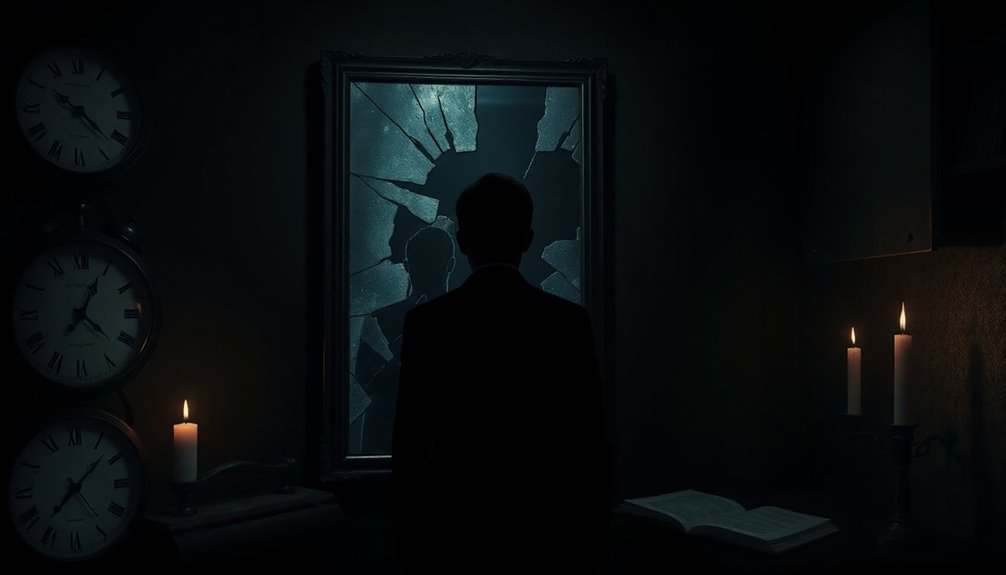
*The Game* is a mind-bending thriller that keeps you guessing from start to finish.
You follow Nicholas Van Orton, a wealthy banker whose life takes a wild turn after receiving an unusual birthday gift from his brother, Conrad. This voucher leads him into a chaotic world of psychological games crafted by Consumer Recreation Services. As pranks escalate into dangerous situations, you’re drawn into Nicholas’s paranoia and isolation, questioning who he can trust. The film explores deep themes of redemption and the need for change, all while keeping you on edge. Directed by David Fincher, this 1997 classic features standout performances that enhance its iconic twist ending, making it a must-watch for thriller enthusiasts. The game ultimately reveals how reality and control intertwine in Nicholas’s life, forcing him to confront his deepest fears. The experience mirrors the importance of setting clear intentions in our lives, as Nicholas’s journey showcases the need for self-awareness and direction amidst chaos.
Inception

As you dive into *Inception*, you’ll find yourself captivated by a world where dream-sharing technology blurs the lines between reality and illusion.
Dom Cobb, played by Leonardo DiCaprio, is a skilled thief tasked with planting an idea in someone’s mind through layers of dreams. As he assembles a team, including Arthur and Ariadne, you’ll navigate complex dreamscapes that challenge your perception of time and identity. The film’s official budget of $160 million reflects the ambitious scale of its production, showcasing stunning visuals and intricate storytelling. In this layered narrative, the power of the subconscious during sleep offers insight into how dreams can be a reflection of one’s vibrational state.
The film explores themes of guilt and redemption, particularly through Cobb’s haunting memories of his wife. With stunning visuals and a gripping narrative, *Inception* keeps you guessing until the very end.
Christopher Nolan’s masterful direction ensures you won’t easily forget this mind-bending experience, leaving you questioning what’s real long after the credits roll.
Mulholland Drive
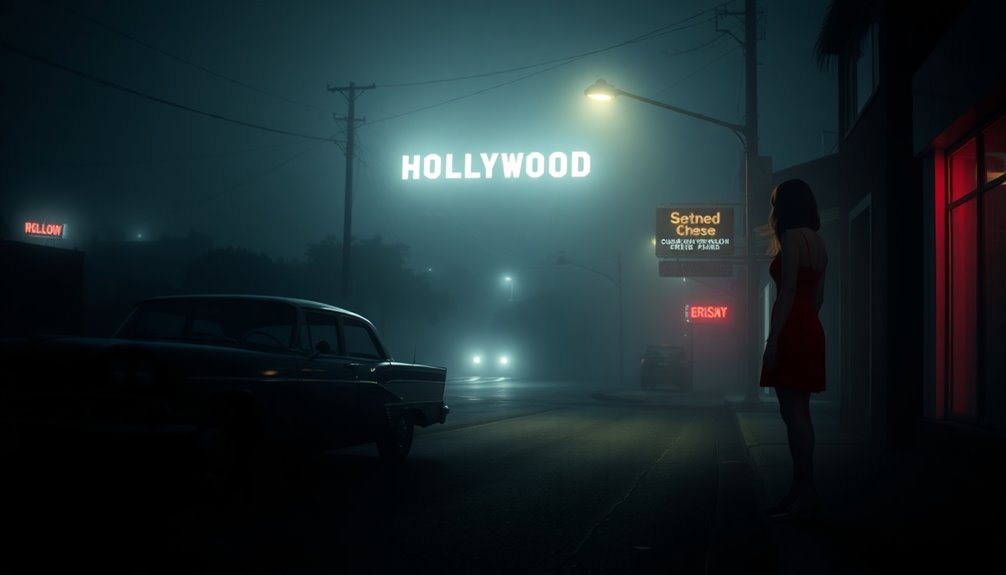
Delving into *Mulholland Drive* reveals a surreal journey through the labyrinthine streets of Los Angeles, where dreams and reality intertwine. You follow Betty Elms, played by Naomi Watts, as she navigates the mystery of Rita’s amnesia. Their relationship is central, steeped in love and betrayal while reflecting Hollywood’s darker side. As you witness their intertwined fates, the film cleverly blurs the lines between fantasy and harsh reality. The haunting symbols, like the blue key and Club Silencio, deepen the narrative, challenging your understanding of identity. Notable for its non-linear narrative, *Mulholland Drive* captivates with its thought-provoking storytelling, leaving you questioning everything long after the credits roll. Ultimately, Diane’s tragic demise encapsulates the guilt and despair that haunt her. The psychological depth of the film mirrors the complexities of music therapy integration, enhancing the emotional experience through a unique auditory landscape.
Black Swan
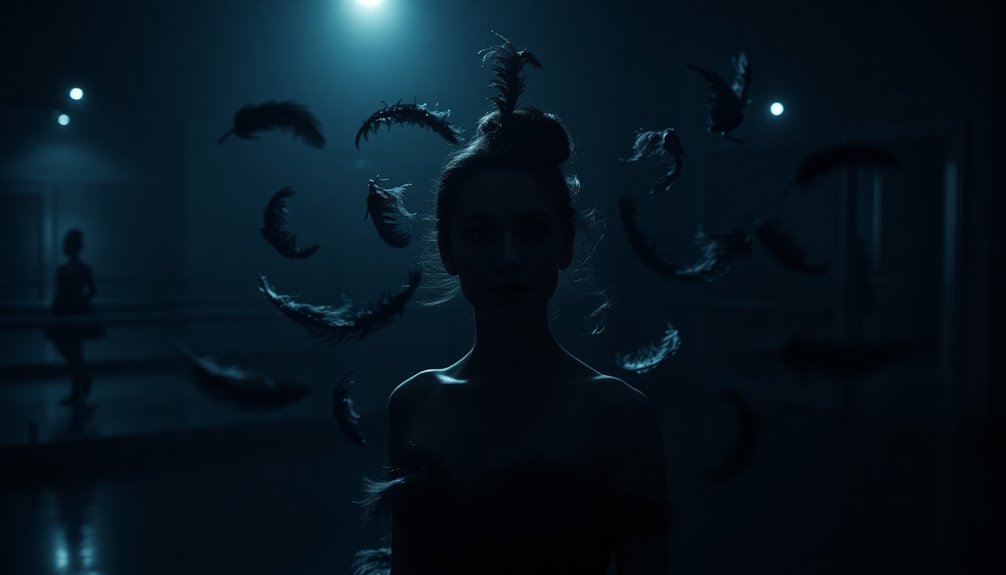
While diving into *Black Swan*, you’ll find yourself immersed in a gripping psychological thriller that explores the dark depths of obsession and the pressures of perfection.
Set in the high-stakes world of ballet, the film follows Nina Sayers, a fragile ballerina torn between embodying the innocent White Swan and the seductive Black Swan.
As the intense pressure for a flawless performance mounts, you witness her descent into madness, marked by hallucinations and paranoia.
The manipulative Thomas Leroy and carefree Lily push her to her limits, while her overprotective mother adds to the emotional strain.
With unsettling visuals and a haunting sound design, *Black Swan* keeps you guessing, reflecting on the fine line between ambition and self-destruction. The film was directed by Darren Aronofsky, who meticulously researched the insular world of ballet to ensure authenticity.
Gone Girl
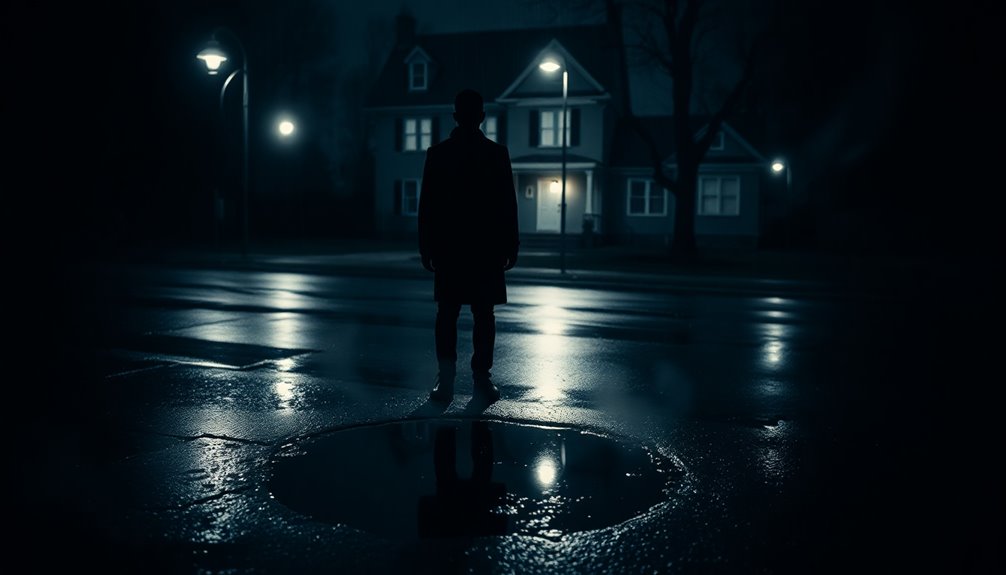
If you found yourself captivated by the psychological tension in *Black Swan*, then *Gone Girl* will keep you on the edge of your seat with its intricate web of deception and manipulation.
The film unravels the twisted marriage of Nick and Amy Dunne, seemingly perfect but riddled with betrayal. When Amy disappears on their fifth anniversary, Nick becomes the prime suspect, and the investigation spirals into a media frenzy that distorts public perception. As the story unfolds, you’ll discover Amy’s chilling plan to frame Nick for her murder, showcasing her cunning and manipulative nature. Additionally, the film reflects on how early detection of deception can change the course of relationships, illustrating the consequences of hidden truths. With each twist, the film critiques the facade of relationships and the impact of media, leaving you questioning the true identities behind the characters.
Triangle

As you navigate the chilling waters of *Triangle*, you’ll find yourself immersed in a gripping psychological horror that blurs the lines between reality and illusion.
Set in the eerie Bermuda Triangle, a group of friends, led by Jess, faces a terrifying storm that leads them to an abandoned ocean liner.
What starts as a desperate escape quickly spirals into paranoia and dread as they’re hunted by an unseen assailant.
Jess soon discovers she’s trapped in a time loop, reliving the horrors over and over. The film’s complex narrative and unpredictable twists will keep you guessing until the very end, challenging your perception of reality and leaving you questioning what’s real and what’s not. This psychological horror is heavily influenced by the concept of déjà vu and cyclical narratives, adding layers of depth to Jess’s harrowing journey.
Identity
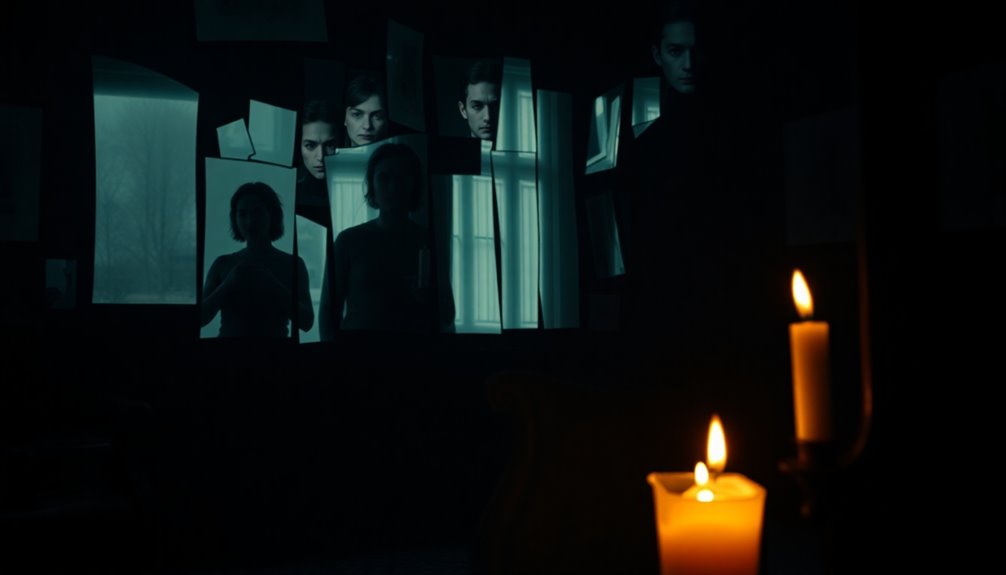
In the realm of psychological thrillers, *Identity* stands out as a masterful exploration of how our perceptions can be distorted and manipulated. Trapped in a motel during a storm, characters are picked off one by one, revealing shocking truths about their identities. This theme of identity confusion runs through other films like *The Return of Martin Guerre*, where a man’s claim to be someone else is met with skepticism. Similarly, in *Secret Window*, a writer battles a mysterious stranger over his own identity. Movies like *Memento* and *Jacob’s Ladder* delve into the fragility of self-perception, making you question the very essence of who you are. Notably, the mystery genre often revolves around the solution to a problem or crime, which adds layers to these identity-driven narratives. These films keep you guessing and challenge your understanding of identity itself, reflecting the importance of recognizing signs of stagnation in personal growth and clarity.
Frequently Asked Questions
What Makes a Movie an Effective Psychological Thriller?
An effective psychological thriller grips you with unpredictable storylines and intense character conflicts.
You’ll find yourself questioning reality as plot twists and unreliable narrators keep you on edge.
Themes of mental illness and moral ambiguity add depth, making characters relatable yet complex.
As suspense builds gradually, you’ll feel the tension rise, immersing you in a world where fear and anxiety reign.
Ultimately, it’s the intricate dance between character and plot that pulls you in.
How Do Unreliable Narrators Enhance a Film’s Plot?
Unreliable narrators enhance a film’s plot by creating suspense and inviting you to question what’s real.
You’ll find yourself deeply engaged as these narrators distort facts, leading to unexpected twists that keep you guessing.
They develop characters by revealing flaws and biases, prompting you to explore different perspectives.
This interactive experience challenges your critical thinking, making you feel emotionally invested in uncovering the truth alongside the protagonist.
What Are Common Themes in Mind-Bending Mysteries?
So, you’re diving into mind-bending mysteries, huh?
Get ready for a wild ride where psychological exploration reigns supreme. You’ll find characters grappling with identity and mental health issues while the line between reality and illusion blurs.
Expect complex plots with twists that’ll make your head spin and unreliable narrators who’ll keep you guessing.
And let’s not forget the eerie settings that add a delicious layer of suspense to your viewing experience!
Can Psychological Thrillers Impact Viewers’ Perceptions of Reality?
Absolutely, psychological thrillers can significantly impact your perception of reality. They often blur the lines between what’s real and what’s imagined, leading you to question your own understanding.
When you watch these films, their themes of obsession and trauma resonate, making you reflect on your own experiences. You might find yourself feeling more paranoid or anxious, as the suspense and tension heighten your emotional engagement, altering how you view both the characters and the world around you.
How Do Ambiguous Endings Influence Audience Interpretation?
Ambiguous endings significantly influence how you interpret a film. They challenge you to engage with the narrative actively, prompting you to fill in the gaps and explore various meanings.
This uncertainty can evoke a range of emotions, making the experience more memorable. As you discuss these endings with others, you deepen your connection to the story, reflecting the complex nature of reality where not all questions have clear answers.
Conclusion
So, you thought you had Shutter Island all figured out, didn’t you? But that twist at the end left you reeling, just like these other mind-bending films will. Each one lures you in with its own web of deception, making you question everything you thought you knew. You’ll find yourself piecing together clues, only to realize the truth is often stranger than fiction. Get ready to lose your grip on reality—again. Enjoy the ride!









